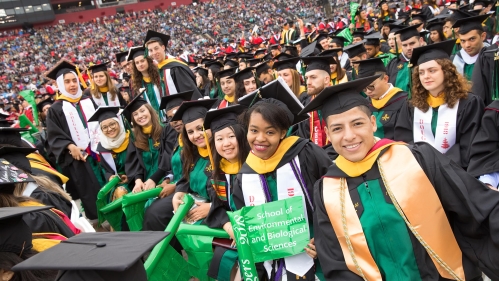
Academic Excellence in Undergraduate Education
Undergraduate Education at SEBS
Undergraduate education at the Rutgers School of Environmental and Biological Sciences investigates the biological world from organisms to ecosystems and focuses on competency, innovation, application, service and community. The School trains the next generation of professionals and leaders by instilling a deep appreciation of the importance of evidence and reason for understanding and managing the critical interrelationship between human actions and the natural environment.
We foster a setting that encourages leadership and that values individuals. Our integrated teaching, research, and outreach programs offer students a complete and well-rounded education both inside and outside the classroom and prepares students for careers and citizenship in an increasingly interrelated, global community.
SEBS School-wide Learning Objectives
The undergraduate curriculum at the School of Environmental and Biological Sciences comprises a common Core Curriculum as well as comprehensive disciplinary concentration through 21 major and 34 minor and certificate programs. Our programs focus on the biological environment from organisms to ecosystems and the ways in which humans interact with and modulate these worlds.
The Core Curriculum provides a background in the liberal arts and sciences through courses satisfying learning objectives in areas of: Contemporary Challenges; Experienced-based Education; Areas of Inquiry in the Natural Sciences, in Historical Analysis, in Social Analysis, and in Arts and Humanities; and Cognitive Skills and Processes in Writing and Communication, in Quantitative and Formal Reasoning, and in Information Technology and Research.
This Core Curriculum provides the foundation for specialized training in a required disciplinary major and for optional concentrations in minor and certificate programs. Each program has a specific set of learning goals described at the individual program websites. However, all programs are guided by the following five overarching School learning objectives:
- Competency in critical thinking, evidence-based argument, and quantitative reasoning
- Proficiency in oral, written, and digital communication and argument
- Ability to evaluate and assess the ethical implications and consequences of specific policies or actions
- Mastery of the fundamentals of a chosen discipline
- Application of disciplinary knowledge to contemporary social, environmental and biological problems
School-level Assessment
Instructional Assessment Committee Guides Program Assessment Practices at SEBS
Assessment of program-level disciplinary learning goals at SEBS is managed by the Instructional Assessment Committee (IAC) in collaboration with the SEBS Office of Academic Programs. The IAC is a product of the SEBS faculty governance process and is defined in the SEBS Bylaws (501k PDF). The IAC helps undergraduate programs to develop and refine their assessment practices, to align the programs in a hierarchy with assessment objectives of the school and university, to promote goal-setting and active management of undergraduate programs, and to document institutional quality. The IAC also serves as an information conduit to the academic and executive deans on matters of program assessment. The information is used by the administrators to set direction and priorities, to take advantage of opportunities for generation of new resources, to make decisions on the distribution of existing resources, and to help with accountability to stakeholders and reporting requirements to Rutgers University central administration.
Curriculum Committee Supports Program Assessment Practices at SEBS
Program assessment practices are supported by the SEBS Curriculum and Educational Policy (CEP) Committee. The CEP is a standing committee with oversight over courses, curricula and educational policies. The committee members include the 18 undergraduate program directors, the Dean of Academic Programs, the Cook Campus Dean, the Dean of Agricultural and Urban Programs, and the Dean of International Programs. In 2015 the CEP instituted a policy over new course and revised course proposals. Such proposals must state how the course maps to program learning goals and must describe the assessment plan. In addition, the syllabus must boldly state which program learning goal the course fulfills, and must include well written and measurable course learning goals.
Program/Department-level Learning Goals
All SEBS-hosted majors have high quality program learnings goals posted front and center on their individual program webpages and in the current Rutgers New Brunswick Undergraduate Catalog.